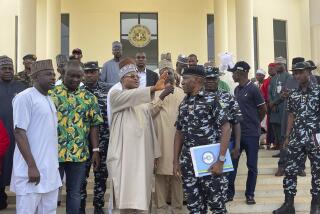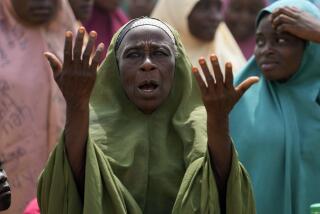Report sheds light on misery of kidnapped Nigerian girls
- Share via
Reporting from Johannesburg, South Africa — In a disturbing look at the abuses endured by 219 Nigerian schoolgirls abducted by Islamist insurgents, a report issued Monday describes victims being forced to convert to Islam and marry their captors, being raped and made to cook, clean, carry ammunition and looted goods.
The report by Human Rights Watch found the 219 girls seized in the town of Chibok in a mass kidnapping in April were among at least 500 girls and women, mainly Christians, who had been abducted since the beginning of last year by the Islamist militia in Nigeria known as Boko Haram.
According to the rights organization, more than 7,000 civilians have been killed in the Islamist insurgency in northern Nigeria since 2009. More than half of the killings have occurred since early 2013.
The kidnapping of the Chibok girls sparked a Twitter hashtag, “Bring Back Our Girls,” and a global campaign to pressure Nigeria’s government to do more to get the girls released.
Nigeria’s defense chiefs insisted they knew the girls’ whereabouts but ruled out a military attack to free them because of the likelihood of casualties. In recent weeks, Nigerian officials have been negotiating in Chad with representatives of Boko Haram, who they claim have offered to release the Chibok girls. Nigeria is reportedly considering releasing members of the militant group in return.
The negotiations have been aimed at securing the release of the Chibok girls but not hundreds of others in captivity. The mass kidnappings began in 2013, according to Human Rights Watch, but the abduction of the Chibok girls, gathered at a school for exams, was the largest single kidnapping.
The militants initially raided the school in search of a brick-making machine, according to the report, only to find there were hundreds of girls who were easy prey after the only guard on duty fled into the night.
Most kidnapped girls and women are taken into mountain caves near Gwoza, where the militias are camped. The militants have taken over more than 10 villages in the area.
Human Rights Watch said it based its reporting on the accounts of more than 46 witnesses and victims, including girls from Chibok who escaped after being held in captivity.
One 19-year-old woman who was abducted by Boko Haram in 2013 described being held in several hill camps for three months. She became a military porter and slave, forced to carry ammunition and to cook for 14 gunmen.
Then, to her horror, she was forced to lure five young men from a vigilante group opposed to Boko Haram, most of them teenagers, into a trap.
The prisoners were taken back to the Boko Haram camp. The insurgents tied up the young men and slit their throats, yelling, “Allahu akbar!” meaning “God is great.”
“Then I was handed a knife to kill the last man. I was shaking with horror and couldn’t do it. The camp leader’s wife took the knife and killed him,” the 19-year-old said, according to the report.
A 15-year-old girl said she and others were forced to convert to Islam after “unbearable” pressure.
“On that day, the leader handed us green hijabs, gave us new Muslim names and instructed the other women in the camp to daily teach us Arabic words. A week later, he performed a ceremony, reading out words in Arabic language and then announced that we were now wed,” she said. Once forcibly married, the report says, the girls were raped daily.
One woman, kidnapped in 2013, tried to escape forced marriage and rape by pretending to be ill. One of the Boko Haram fighters paid a “dowry” to buy her and came into the cave where she was lying to claim her as his wife.
“The commander’s wife blocked the cave entrance and watched as the man raped me,” she told Human Rights Watch,
Another kidnapped girl, 15, was also forced to marry.
“He soon began to threaten me with a knife to have sex with him, and when I still refused he brought out his gun, warning that he would kill me if I refused,” the girl said.
Many of the abducted girls were taken prisoner at roadblocks set up by Boko Haram. They described people being separated into groups of Christians and Muslims. The Muslims were freed. The Christian boys and men were killed. Sometimes Christian women wearing trousers were also shot. The remaining Christian girls and women were then abducted and taken to the militia’s camps.
Amid reports that Nigeria’s military failed to prevent attacks on civilians during the insurgency, Human Rights Watch called on authorities to take adequate measures to protect the population in the country’s northeast.
“Abuses by Boko Haram and inadequate responses by the government are leaving many people in northern Nigeria beset by fear and anguish,” said Daniel Bekele, Africa director at Human Rights Watch. “The government and its allies need to step up their protection, support services, and prosecutions of abuses on both sides to stop this cycle of terror.”
Follow @RobynDixon_LAT for news from Africa
More to Read
Sign up for Essential California
The most important California stories and recommendations in your inbox every morning.
You may occasionally receive promotional content from the Los Angeles Times.










